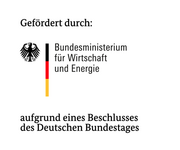TEMPRO

Duration:
01.11.2016 - 31.10.2019
Funded by:
Bundesministerium für Wirtschaft und Energie
Supported by:
Projektträger Jülich
Coordinator:
Dr. Ing. Alexandra Pehlken (Research Group Cascade Use)
Project number: 03ET1418A-H
TEMPRO
There are about 50,000 data centers in Germany. They consume about 2% of the total electricity demand of the Federal Republic of Germany - and the trend is rising. Furthermore, due to the short lifetime of ICT products, grey energy - i. e. the energy used to manufacture, transport, store and dispose of technical components - is also relevant for the total energy consumption of a data centre.
TEMPRO was the first project in the context of the consideration of the energy efficiency of data centers, which also considered upstream and downstream value creation stages. The overall objective of the project was to achieve a holistic increase in the energy and raw material efficiency of data centres in Germany.
"The total energy requirements of data centers are rising very significantly. The increasing digitalization of economy and society requires more and more energy and natural resources," explains project manager Dr. Alexandra Pehlken. "We were able to calculate that the more than 50,000 data centers in Germany consumed 14 billion kWh of electricity in 2018. This is 2.7% of Germany's electricity consumption and almost 40% more than in 2010." Added to this is the so-called grey energy, which is generated during manufacturing and transport of the devices and systems installed in the data centers. "In TEMPRO, we were able to estimate this grey energy for Germany for the first time," says Pehlken, "this has created a basis for us to be able to assess the environmental impact of data centers holistically in the future."
In view of the global environmental situation, the increasing energy and resource requirements of data centers in the future pose new challenges for companies and politicians. "Despite significant efficiency gains, the energy and resource requirements of data centers in Germany are expected to rise by more than 50% by 2030," explains Dr. Ralph Hintemann of the Borderstep Institute, "Business and society are generating more and more data that has to be transmitted, processed and stored. This leads to more and more very large data centers." With new technologies such as autonomous driving, industry 4.0 and the expansion of 5G mobile radio networks, more and more smaller so-called edge data centres are also being set up. Hintemann: "The energy-efficient construction and operation of edge data centers is a challenge. In 2030, Edge data centers could be responsible for a third of the energy requirements of all data centers in Germany."
TEMPRO also provided concrete assistance, starting points and options for action to reduce the environmental impact of data centers. Among other things, software tools have been developed that support energy- and resource-conscious data center operations. With the ERBET initial evaluation tool (https://www.tempro-energy.de/erbet/ ), which is now publicly available, data centre operators can, for example, estimate and evaluate their total energy requirements. In TEMPRO, more than 60 new energy- and resource-saving technologies were analysed and evaluated. The business partners BTC IT Services GmbH, dc-ce Berlin-Brandenburg and the Zweckverband Kommunale Datenverarbeitung Oldenburg have developed prototypes of particularly promising technologies. "We were able to show that, despite increasing digitalization, a trend reversal is also possible in the future in the development of the energy requirements of data centers," says Pehlken. "If it is possible to make greater use of the technologies we have identified and developed, the holistic energy requirements of data centers in Germany could also decline in the future. We believe a reduction of 25% until the year 2030 is possible."
TEMPRO was a joint project led by Carl von Ossietzky University Oldenburg. Project partners are:
- Research Cascade Use, Carl von Ossietzky University Oldenburg.
- department Business Information Systems / Very Large Business Applications (VLBA), Carl von Ossietzky University Oldenburg
- Borderstep Institute for Innovation and Sustainability gGmbH, Berlin
- ad. Prof. Innovation Management and Sustainability, Carl von Ossietzky University Oldenburg
- Institute for Environmental Technology and Energy Economics - Waste Resources Management, Hamburg University of Technology
- b.r.m. business resource management, Management- und Technologie-Consulting, Inhaber Harald Rossol e.K., Bremen
- BTC IT Services GmbH, Oldenburg
- CEWE Stiftung & Co. KGaA, Oldenburg
- dc-ce Berlin-Brandenburg GmbH, Teltow
- HPE - Hewlett Packard Enterprise, Deutschland
- MAIREC Edelmetallgesellschaft mbH, Alzenau
- Zweckverband Kommunale Datenverarbeitung Oldenburg (KDO), Oldenburg
PIN acted as an internal service provider within the framework of the project and was responsible for research, preparation, implementation and evaluation of various innovation workshops.

